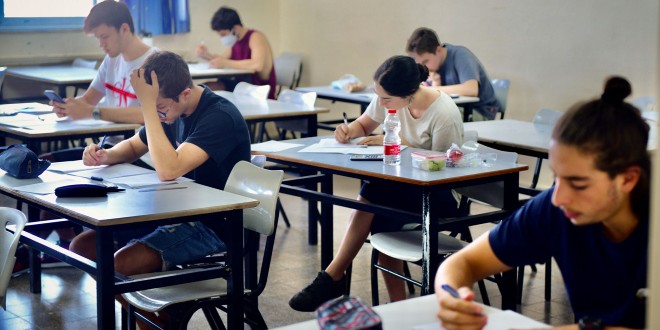Reforms by Israel’s educational system a few decades ago that created a “basic academic track” for high school pupils to achieve matriculation failed to catapult those from weak socioeconomic backgrounds to an academic degree and high-earning jobs. This unintentional but unfortunate result, which continues today, was discovered by education experts at Jerusalem’s Taub Center for Social Policy Studies who have just published their findings.
The study examined the long-term impact of tracking and sorting mechanisms in high school programs on pupils who were in high school during the 1990s and on the resulting inequality. It was conducted by Dr. Eyal Bar-Haim, a postdoctoral fellow in the education department of at Ben-Gurion University of the Negev (BGU) in Beersheba and Prof. Yariv Feniger, a BGU education faculty member who is also fellow in the Taub Center Education Policy Program.
The researchers described the differences among five main tracks in secondary education in Israel – the advanced science and technology track; the regular academic track; the basic academic track; the regular technology track; and the vocational track. The basic academic track was added to the system in the 1990s to meet the needs of low-achieving students, most of whom came from weak socioeconomic backgrounds. Before this reform, these pupils from weak families were usually sent to the vocational tracks to work with their hands instead of their heads because the system feared they would not succeed in more intellectually demanding fields.
The study, entitled “Tracking and Its Long-Term Effects on Educational Achievements and Earnings of High School Students in the 1990s,” found that there is a close connection between a pupil’s socioeconomic background and the sorting into tracks. The tracking in high school accounts for almost 30% of the explained variance of earnings in adulthood, and it is the second most important factor in explaining earning gaps after gender. Although the basic academic track increased the chances of attaining a “bagrut” (matriculation) certificate that enables graduates to be accepted by a university or college, the chances of its graduates acquiring an academic degree and finding a high-earning job are low, and essentially, the “tracking effect” persists even today, the Taub researchers found.
The study examined for the first time the impact of the basic academic track on its graduates, from the perspective of their education and employment outcomes during the fourth decade of their lives. The findings of the study show that the likelihood of pupils in the basic academic track acquiring an academic education and attaining high-paying employment was similar to that of graduates of the vocational track.
The researchers showed that there was a close relationship between parents’ education and into which high school track their children were placed. The chances of children of well-educated parents studying in a prestigious track – and later on acquiring an academic education and attaining high-earning employment – were much higher than for children of parents without an academic education. Tracking harms the chances of acquiring an academic degree and attaining high-earning employment
The analysis relates to Jews only, primarily because in those years, many Arab students dropped out of high school before the bagrut exams and thus the classification of high school tracks was not relevant for many of them; in addition, the authors did not have sufficient information for this classification (since it is based on data on pupils who took the bagrut exams). In addition, the decline in vocational-technological education and its replacement by the basic academic track occurred primarily in the Jewish education system.
“This is the first time that the problematic nature of this track has been studied from the perspective of educational and employment mobility. This track is different from the old vocational tracks, but it produces similar outcomes and essentially the negative effect of tracking continues to exist until today,” Feniger stressed.
The study found that there is a clear connection between a pupil’s socioeconomic background and their educational track and that the type of track has a long-term impact on their chances of acquiring an academic degree and attaining high-earning employment during the fourth decade of their lives.
There is still significant inequality in educational opportunities today, the authors found, and the reforms carried out from the 1970s to the 1990s did not meaningfully change the close relationship between a student’s socioeconomic background and their educational track placement. Bar-Haim pointed out that “the study proves that even a reform that is based on choice – whether it be the choice of the pupils, the parents, the teachers or the principals – cannot alleviate the inequality in educational opportunities; this creates disparities in the labor market as well. To reduce inequality, it must be dealt with directly rather than by building mechanisms that try to conceal it.”
Taub Center president Prov. Avi Weiss commented that “the study’s findings highlight a major barrier to social mobility in Israel; however, they also set out a roadmap for improving the situation. The high school study track is important – not just with respect to the likelihood of acquiring an academic education, but also for its impact on future earning ability, even after controlling for the effect of an academic education on earnings. The effort to integrate students from weaker populations into prestigious tracks has the potential to impact positively on Israeli society.”
The Taub Center for Social Policy Studies in Israel, established four decades ago, is a leading, independent and non-partisan socioeconomic research institute in Jerusalem. It provides decision makers and the public with research and findings on some of the most critical issues facing Israel in the areas of education, health, welfare, labor markets and economic policy in order to impact the decisionmaking process in Israel and to advance the well-being of all Israelis.
The shortcode is missing a valid Donation Form ID attribute.


